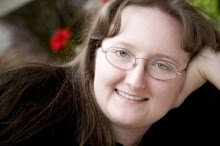Follow up to Familiar Strangers
 I decided not to go to my bio uncle's this past weekend. My mom went. She said she had a good time. She loves her siblings and was looking forward to seeing them when we talked before she left.
I decided not to go to my bio uncle's this past weekend. My mom went. She said she had a good time. She loves her siblings and was looking forward to seeing them when we talked before she left.Part of the reason I decided not to go was that I had already made plans for this past weekend and was really looking forward to them. I decided I was not going to just kill my plans just because I received an invitation to do something else. I will go to my uncles this weekend with my husband instead. None of the rest of my bio family will be there this week, except my uncle and his girlfriend, but maybe it is better that way for now, for the reason spelled out in the October post I called "Choices".
Another thing that crossed my mind, I'm sorry to say, was the fact that my uncle called less than a week in advance to invite Mom and I. I do not know how long ago he decided to have Thanksgiving at his house, but it did not sound like this was thrown together at the last minute. It felt like Mom and I were after thoughts and I am not okay with that. To me, this is what we have always been in my biological family and I don't like it. When people get married or have a baby, we never find out until right before and then we have to scramble if we want to be involved. When people die, we hear about it not when they first got sick, but once they are already dead and it is too late to say goodbye. Sometimes we don't hear at all. It has been this way since I entered foster care 16 years ago. That means that for 2/3 of my life, I have been out of the loop.
So, I want to see my bio family and all of that and I do not expect them to change their plans to fit my schedule or anything, but I also do not want to be an after thought. I think I would encourage this by sending the message that I have no life and am just waiting for their call or that if I do have plans and they call at the last minute, that I will just ditch whatever is going on with me to be with them. If they want a special presence in my life, they need to earn it, just like everyone else has. In the mean time, I will be happy to go see whichever of them care to see me, but I'll have to fit them in where I do not already have plans.








